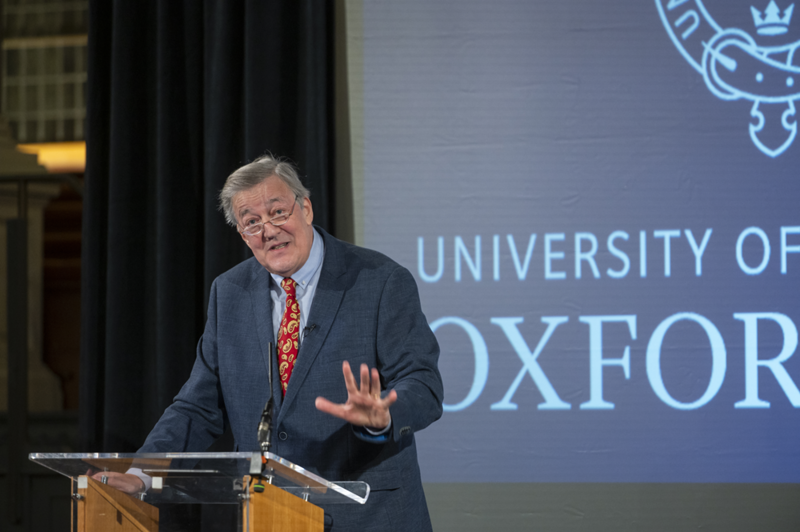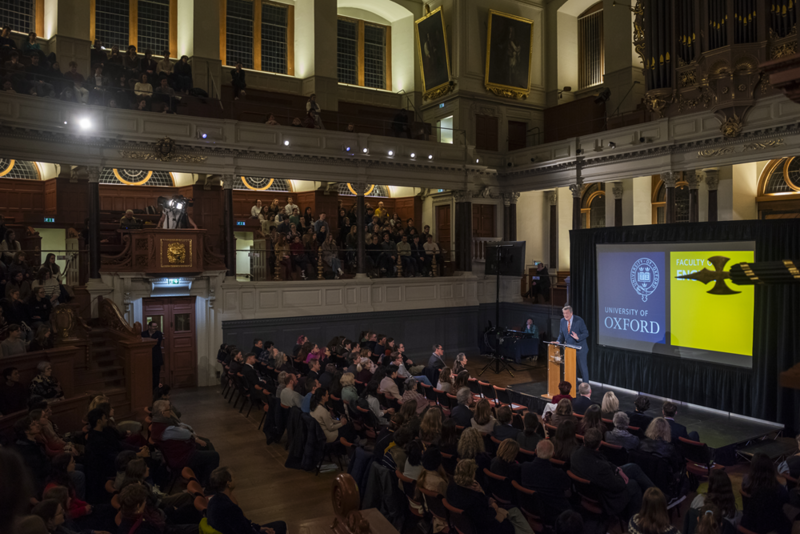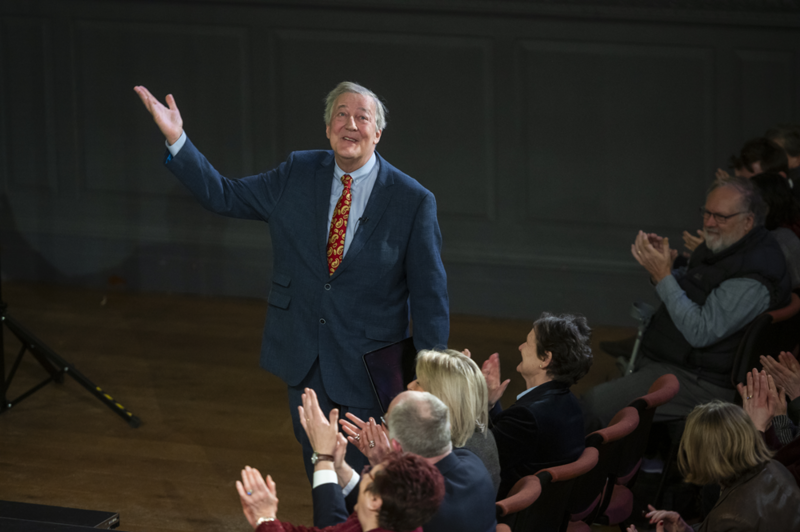As Oscar Wilde once said, “Under the wild-rose let us play”: On Stephen Fry’s lecture

Photo by John Cairns
How does one transcribe a performance that relished in its verbal medium? Stephen Fry’s lecture was an experience in and of itself, and though I will try, Fry’s wit will remain uncaptured.
Professor Simon Horobin introduced Sir Stephen Fry, the News UK Visiting Professor of Creative Media, as a “philologist in the etymological sense of the word” — a true “lover of words”. This great love of his shone throughout Stephen Fry’s speech. It was infectious. And how will I sum up such a speech which was more than a communication of a wider message, more than a means to an end? How does one transcribe a performance that relished in its verbal medium? Stephen Fry’s lecture was an experience in and of itself (not unlike the many musical concerts the Sheldonian houses), and though I will try, Fry’s wit will remain uncaptured.
The night was full of unexpected turns and anecdotes from which this great love of words emerged. Even the beginning of Fry’s lecture felt akin to the lifting of a curtain, a metatextual beginning which went beyond a beginning; he considered the meanings of “visiting professor” and “creative media”, and then he considered us, his audience. We were asked who the audience was — a question which seemed to me like the moment when a mirror was held up to the seats of the Sheldonian, drawing us all into the lecture, making us a part of it. Fry even thought of the ghosts of Academics Past and what they would have thought of the concept of “creative media” (ghosts who seemed to shimmer momentarily at this unexpected invocation). This self-awareness held up to us, the audience, was one which Fry frequently and expertly turned on himself. He explored this relation between him as the speaker and us as the audience and how these two identities interacted; even referring to himself as “one more damned boomer”, wary of providing “meme-able patches” (and though perhaps not “meme-able”, his lecture was indeed quotable and is now included in my daily references).
We suddenly found ourselves within Fry’s dream, having been taken there by his refusal to bombard us with “motivational quotlets”. “Follow your dreams”, well, okay then, he said, and seared into our minds an image of him in a London bus, having a pillow fight with Claudia Winkleman with Chomsky as the referee (one of the many delightful images that have remained with me since that Friday evening).
Having lifted the veil between audience and speaker, word and performance, Fry then began the story of how he was “bitten by language”. He started with his childhood discovery of his talent for anagrammatizing (a talent accompanied by impersonations of illustrious figures like Steve Jobs, and a very amusing anagram Fry had concocted for Alan Bates). So, “words became my friends”, Fry mused. I wonder how many people in the audience started to think of the inception of their own friendship with words — the mirror Fry set up at the beginning of the lecture having remained there and mingling Fry’s memories with everyone else’s for the rest of the evening. Oscar Wilde had changed Fry’s life — where the melodic language of The Importance of Being Earnest had made him want to dance. I am sure that this love at first sight Fry experienced with Wilde’s language resonated with many in the room (I thought of the first poetry book I had ever worshipped: a collection of Wilde’s poems I had begged my high school librarian to let me have). For Fry, language expanded to “be all those things I was useless at”; at once becoming a form of movement and music.

Photo by John Cairns
From the infectious beauty of Wilde’s language, Fry launched into a defence of “long, greasy, Latinate words” which faced slander when pit against the “genuine” and “from the heart” associations of Anglo-Saxon words. To describe a word as greasy — what an image! Norman words were thus attributed to the head and not the heart, made into classical structures that lacked the presumed nativeness of the Anglo-Saxon. Yes, one could say “I love you”; but one could also say, as Fry quoted from the heart, “I shall not offend you if I state quite frankly and openly that you seem to me to be in every way the visible personification of absolute perfection”. This utterance of Algernon’s from The Importance of Being Earnest felt to me to be the reverberating centre of the lecture. Fry underlined its originality. Perhaps Latinate, perhaps overdone, it was worth so much more because it was singular. Its words seduced. Then, Fry’s own use of language began to soar. I found myself unable to capture his words which flew across the room as he told us to “play with”, “convert, “harness” words. His every verb had a distinct taste, sound, and visual; they were microcosms of delight, and I was not fast enough to write them down.
Having read Wilde’s Complete Works, Fry said he was disappointed that he had “sucked Oscar Wilde’s peach dry” until he read of his trials and found himself chasing down Queer Literature in the library — a search for “affirmation”, which had, he said, led to an “education”; a revelling in the language of “passion” and “revolt” which left him wanting to write. Fry touched upon the question of individual style in writing — a worry which will have undoubtedly entered the mind of anyone who has ever written anything extensive. The necessity of a strong “you” in writing renders Borrowed Style “a cliche to be avoided like the plague”. Or an even shinier image which I thoroughly enjoyed; “a magpie’s nest of glittering trinkets”. Fry named the feeling fittingly when he described this anxiety around the perceived lack of individual style as an “embarrassment about the private world of my writing”. This common fear, made material, was immediately reassured when suddenly we were presented with the image of a child, copying the letters of their teacher from a blackboard. Somewhere along the way, these initial insecure and shaky attempts at replication would blossom into distinctive handwriting.
I have never laughed this much during a lecture. Ornamented with endearing moments of profanity, Fry’s jokes continue to make me chuckle, out of the blue, when I remember them. I found myself trying to repeat some of these comedic moments to friends and family but, of course, it did not have the same effect as hearing it from Fry himself. There are many layers in the way Fry speaks, so many layers of awareness which, in turn, create “wit”. Fry at once speaks and thinks with you, vocalising your thoughts as he subverts them.
If we were to go back to the question of the “verbal dandy”: does it indeed “obscure, deflect, distort…”? Once again, I hurriedly tried to write his words down as they ran away from me, laughing and shiny. Contrasting and exulting both Vermeer and Van Gogh, Fry rejected the perception that a zero-sum game existed between what he called “realism” and “profusion”. The “Oxford Temper” (a term I think of often now) was to “play gracefully with ideas”, it was something you did through language; not with anger and violence, but with grace. And there was Fry’s “trumpet call” again as he urged us to “play” with words, to love both Vermeer and Hemingway but not at the expense of “exuberant verbalists”. He told us to succumb to the beauty of words. To let ourselves see and feel their beauty in the first place.
Stephen Fry’s lecture was a performance, and unfortunately, no summary will do it justice. Having heard the way he himself plays with words, my friends and I found ourselves in Blackwell’s (with many others from the audience), trying to purchase this voice of his captured in a book, accessible at all times. While writing this blog post, I realised I wanted to omit parts of the lecture so I could let you hear it first from Fry himself. We left the lecture smiling; the words in our mundane chatter somehow tasting sweeter.
Written by Mina Yucelen, a third year History and English student at Balliol College
This lecture was funded by News UK.

Photo by John Cairns

Photo by John Cairns



